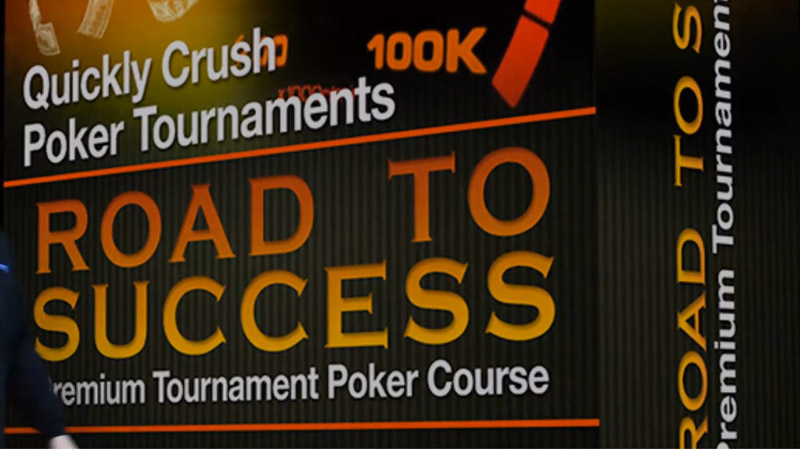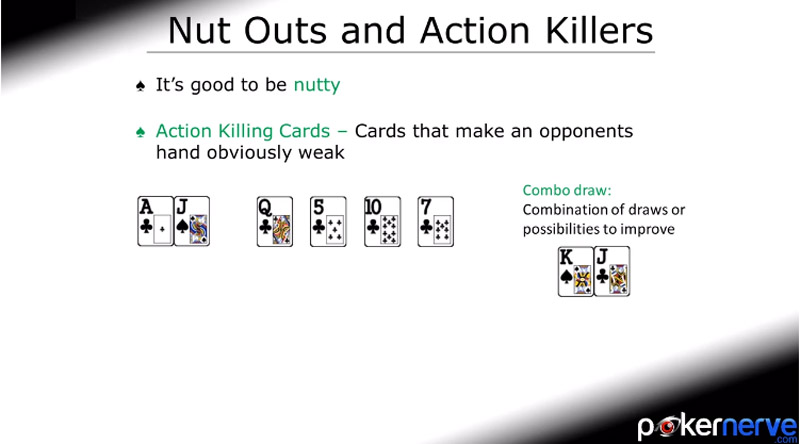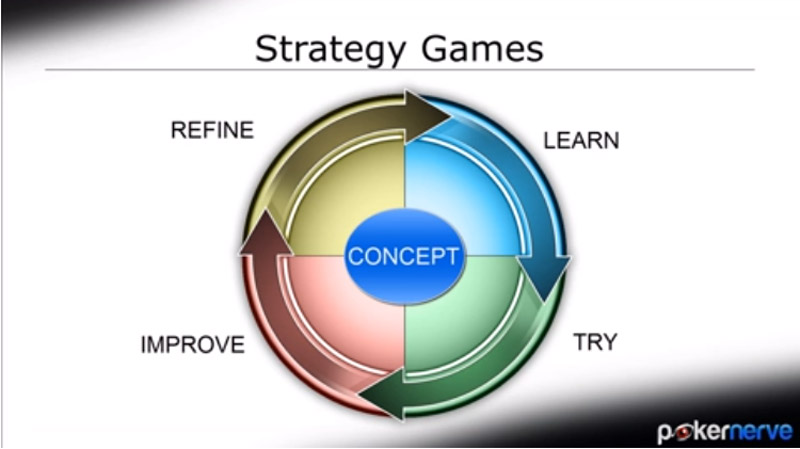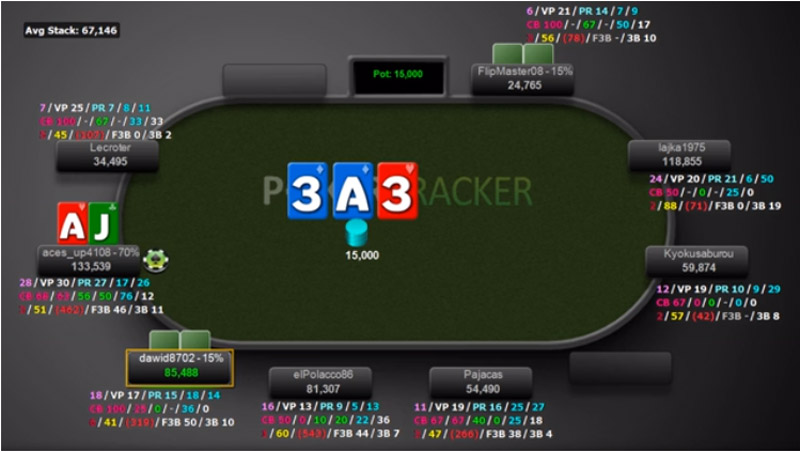If you’re looking for a poker course to teach you how to play multi-table tournaments better, there is definitely plenty to choose from. There are many good poker training programs that will significantly improve your play and easily pay back the money you invest in buying them.
But even in that crowded world of poker training, PokerNerve’s Road to Success manages to stand out as one of the most comprehensive and detailed courses out there. The great thing about it is that the man behind it, Kelvin ‘aces_up' Beattie, has built it in a way that it works for players of almost all skill levels with either the starter course or the premium course.
With more than 80 hours of video content in the premium course, various useful charts, and six different modules, you can start with Road to Success at any stage you like. If you’re a more experienced player, for example, you can skip the first couple of modules where basics are explained, and move on to more advanced skills and concepts.
But even if you’re a complete novice looking to slowly build your way up in MTTs, this course has you covered. Beattie really starts at the very beginning and works from there. Every module is very detailed and provides a wealth of information and hands-on examples to make adopting that information easier.
Personally, I love the fact he also put in the effort to make things light and entertaining as well, by adding stuff like short clips from popular “Micros” and other goofy animations. The path to becoming a good MTT player is a long and gruelling one and ‘aces_up’ doesn’t try to tell you otherwise – but he does what he can to break things up a bit with well-timed jokes.
In this review of Road to Success by PokerNerve, I will try to give you an idea of what you can expect to find inside. There is way too much information to really scratch the surface but at least you’ll have an overview of sorts of how this course is structured and if it is what you might be looking for.
Module 1: The Basics
‘Aces_up’ really starts at very beginning, explaining the very basic things like how to register for tournaments on PokerStars, how to find the useful information in MTT lobbies, etc. Since this is a course more geared towards online players, many new to the game will appreciate it. It may seem boring to those who have been around for a while but you can easily skip it.
After the introductory video, the first module moves on to more practical lessons, the first one being on hand selection. The course covers the importance of solid starting hand selection but also explains reasons behind why such an approach works. You also get free charts with starting hands for different positions at the table.
What makes this and other lessons in Road to Success even more valuable is exactly the fact Beattie takes time to explain whys behind almost everything he explains and discusses. You’re not asked to just blindly believe things but rather guided to figure them out on your own.
After starting hands, Module 1 moves on to discuss different board textures and how changes to board texture can significantly impact your plans in the hand. The lesson provides nice visual representations of these ideas as well. Again, it is fairly basic stuff for someone who’s been playing for a while but it’s an excellent resource for new players.
The same goes for the rest of the lessons in the first module talking about basics of betting, position, and how to properly evaluate the strength of your hand once the flop is out.
Finally, ‘aces_up’ also talks about psychology of poker. This lesson is a great watch even for experienced players as it talks about many common but often forgotten concepts like developing and maintaining a winning mindset, properly dealing with variance, and, of course, solid bankroll management.
Module 2: Stack Sizes, Odds & Outs
The second module of Road to Success by PokerNerve continues to present game basics, which don’t just apply to MTTs but to poker in general. In the first lesson, you’ll find out about the importance of stack sizes and just how important this skill is to have, especially in tournament poker.
A different video in the same module will then come back to this idea and talk about how to properly adjust your play based on your stack size. What does it mean to be a short stack in a tournament and how should you approach this situation? What about playing a big stack? And how things change when you’re sitting on a middling stack in particular.
This module also talks about some basic mathematical concepts such as calculating your odds and outs and EV. Once again, it may be something you already know but, if you do, you also know this is something no player can expect to achieve good results without. So, props to Beattie for taking time to do it all over again and provide players with everything they need in one place.
Another topic that Module 2 of Road to Success covers is different types of players. You’ll learn what things to look out for to quickly categorize players and make necessary adjustments based on those categorizations. While this may not be what you’d call “core” strategy, it is an important skill to have and it’s good to start thinking about it early on.
Module 3: Developing Deeper Understanding of the Game
In Module 3, things start to become more serious. After laying out the foundations and explaining basic math and strategies, ‘aces_up’ starts explaining more advanced concepts, starting with combinatorics.
In poker, hand combinations are everything. What are the odds of being dealt a certain hand or seeing a particular flop? Is there a way to know? There is and the first lesson of this module explains everything you need to know about it, from using the software called Equilab to different formulas you can use to quickly figure these things out.
This video is followed by another lesson on preflop play. The lesson continues on what’s been explained earlier but further develops certain ideas like varying your preflop ranges so that they aren’t always fixed by a chart. Beattie goes into various examples to demonstrate a number of key points here.
In this module, you’ll also learn about semi-bluffing: what it is and when you should use it. Figuring out good spots to semi-bluff means looking into a number of factors such as your pot and fold equity as well as a player you’re up against. Once again, ‘aces_up’ brings out many examples but also looks into PIOSolver to further break down the numbers.
One video that is really interesting to watch in this module is entitled ‘Piecing It Together’. In this video, players of different skill levels (amateurs, more experienced casuals, and professionals) give their different views of exact same spots. It is both entertaining and educational to see how they’ll often go completely different ways as amateurs usually fail to consider everything they should and just play their cards.
Aggression is important in poker but it only works if you know what you’re doing. Finding good opportunities to put the pedal to the metal is essential to your long-term success but how do you actually do it? After watching a couple of lessons in this module, you’ll have a much better idea.
Finally, Beattie addresses play from the big blind. This is a very important area of tournament play and two videos in this module focus only on your preflop decisions in the big blind. You’ll learn there are many great spots where you can improve your play in these situations and will find out how to find your own BB leaks using Poker Tracker 4.
Module 4: Next Level Thinking
In Module 4, Road to Success by PokerNerve moves on to deeper topics and starts looking at poker from a perspective of a more experienced player. Some players may choose to start the course here while others should be able to keep up if they’ve seen the videos before.
The first video in this module is about bluffing. It is the first time the course really talks about pure bluffing, probably because this is something that only comes once you have all the fundamentals sorted out. Once you do, you can start looking for opportunities to profit from your bluffs and target particular player types that are likely to be more susceptible.
Going hand in hand with this is the idea of planning your hand ahead of time. Once you know about starting hands, odds, and outs, you want to start developing the next level mindset. You want to be thinking several streets ahead and that’s something you can achieve. It’s not easy but this video will help you understand how to develop in that direction through theory and hands-on examples.
At this point in your poker career, you should be ready to adopt what ‘aces_up’ refers to as multi-level thinking. You’ll start noticing mistakes your opponents are making – often the same mistakes you used to make. It is very important to be able to identify what level your opponent is on and then profit from that knowledge.
Among other things, this module also explains Heads Up Displays (HUDs). According to Beattie, this is where you can finally start to take advantage of poker stats and understand them on the level where they’ll actually be helpful to you and not create a counter effect. You’ll learn how to set up a HUD in Poker Tracker or Holdem Manager, what stats you should particularly focus on, and how to best utilize the information available to you.
Module 5: Play by the Stages
Pretty much every MTT is split into several stages. These stages differ quite significantly because blinds increase, stacks become shallower, and as the money bubble approaches, certain adjustments are required. In Module 5, ‘aces_up’ goes through different stages of an MTT and explains how to successfully adjust your strategy for best results.
For the early stage play he proposes an approach that is likely different from what you may have read or heard about elsewhere. Beattie prefers a more aggressive approach to early levels where you really give yourself a chance to chip up. By this point, you should already have a good idea of what it means to play tight and pick your spots so this is an additional alternative that can help expand your horizons.
As a tournament moves to middle stages, you’ll have developed some sense of how your opponents are playing and you’ll have some stats on them. Using this knowledge, combined with the knowledge of how starting hand values change in this stage is essential. Why is it that you should prefer big cards over more speculative hands and what will be your biggest spots to chip up?
A couple of videos cover ICM and bubble play. If you don’t know what ICM is and why it is important in MTTs, you’ll get all your answers here. Even if you do have some idea bout ICM, this module really dives into the topic and breaks it down so that you can fully understand why this concept is so important in tournaments and how you can utilize it, especially near the bubble.
Once you get to the final table, things change once again. You’ll need to size up the table at the very start and pick your spots. You’ll obviously use your HUD stats but you’ll also learn about additional resources you can use to find out about players, such as their average buy-in and profitability, which can greatly help you make better decisions against them.
The final video in this module focuses on the heads up play. This is the final stage of every tournament (unless there is a chop) and the pay difference between the first and the second is usually very significant. You’ll learn some specific heads up skills and things to look out for when playing against the final opponent in an MTT such as how to best realize your equity against certain types of players and much more.
Module 6: Advanced Concepts
The final module of Road to Success was actually added after the course was released. This is always a good sign in general as it shows the course creators are interested in keeping their material alive and provide additional value for those who had already purchased the course.
In this module, you’ll find several videos discussing particular concepts, such as refined opening ranges, play from the small blind, advanced continuation betting concepts, donk betting and over betting, and even some specific strategies for KO tournaments.
The fact of the matter is, Road to Success was a complete MTT course even without this segment so all these videos are great resources to refine your knowledge and add some improvements in specific spots. Once you’re done with the main course, these are definitely worth a watch.
PokerNerve's Road To Success Course pros and cons
To summarise, here is what I like and dislike about the course.
What I like about The Road To Success
- The 7-day course trial so you can try out the training for very cheap.
- Lighthearted content – the course is broken up awith well-timed jokes which defitely makes it more engaging.
- This course is very beginner friendly as it specialises in the arguably softest game type and starts with the very basics of tournament poker.
- Opening hand charts.
What I don't like About PokerNerve
- Some of the early lessons need a modern touch up regarding intros and bet sizing. However, this is being addressed.
- The requirement to use the PokerNerve website to access content and you cannot download videos.
- Some parts of the lessons should be in the supplements e.g. 2nd half of lesson 1.1.
Road To Success course signup options
There are two sign up options you can choose from if you decide to go with the Road To Success course. The first is the starter course which covers the first two modules of the course which typically retails at $139 but can be picked up for 25% off ($104.25) using coupon code HOWTOPLAYPOKERINFO. This is recommended if you are a novice of the game and have yet to crack a profit in MTTs.
Alternatively, if you are a breakeven or slightly winning player at the micro MTTs, then you would be much better off investing in the full premium course. This will bring you a return on investment rather quickly if you are ready to put in the work and improve your game. Again, you can get 25% off this course using HOWTOPLAYPOKERINFO, totalling $517.5 down from $690.
You can try out both course with a 7-day trial for just a few dollars, so if you aren't entirely sold yet, I'd recommend checking it out before purchasing!
There are also 3 month and 6-month payment plans in you aren't ready to pay it all upfront.
Conclusion: Is Road to Success a Good MTT Course Investment?
Although there is always some degree of subjectivity in these things, I’d say that this is one of the most comprehensive and ‘down-to-earth’ tournament courses out there – and I mean this in a very positive way. ‘Aces_up’ has done an excellent job of creating a course that can really take a player from a total beginner to a very solid, winning player.
While all important concepts are covered (and really covered in detail), there isn’t too much focus on solvers and raw numbers. They are there, of course, to back up the theory, but not to the point where the course would become dry or difficult to watch. There are many hand examples and even full tournament reviews as well added as supplements to main modules.
Of course, if you want to go through it all, you’ll need to set some time aside. It will take a while to watch all of these lessons in peace and take in what’s being discussed. In fact, Road to Success may be too comprehensive as the amount of the material inside might scare off some players. There is no such thing as too much knowledge but I can definitely see how certain players would prefer a more condensed version.
I am convinced that this course can help almost everyone become a better MTT player, as long as they’re willing to spend the time required to go through the lessons and apply them to your game. The knowledge you’ll find inside is nicely organized, well-presented, and, most importantly, adjusted for today’s games so what you learn, you’ll be able to apply at the tables almost without exception.






